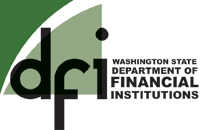Winter 2020 Newsletter
From the Field - Common Exam Findings
The following are some of the common violations our exam teams in each industry found during examinations in the last quarter:
- MSB Programs
- Mortgage Originations - Mortgage Broker
- Mortgage Originations - Consumer Loan
- Mortgage Servicing
- Escrow Agent
MSB Programs
- Anti-Money Laundering Program and Risk Assessment - Licensees are required to conduct an anti-money laundering risk assessment, from which to design an effective anti-money laundering program tailored to the Licensee’s actual policies and procedures as required by 31 CFR 1022.210.
- Business Resumption/Disaster Recovery Plan - Licensees are required to establish written policies and procedures in the event of an interruption to business or damage to books and records. This includes policies and procedures for responding to a data security breach per WAC 208-690-280, and WAC 208-690-270, and records disposal policy per WAC 208-690-125.
- Transaction Disclosures - Licensees must provide specific disclosures prior to each transaction as required by WAC 208-690-205. For all transactions, a fraud disclosure must be made. Additional disclosures are required by licensees engaging in virtual currency transactions, or currency exchange transactions dealing with a currency of limited convertibility.
Mortgage Originations – Mortgage Broker
- Mortgage Call Reports (MCR) – Examiners have continued to identify MCRs that are not completed as required. Licensees are reminded to review the instructions and to familiarize themselves with the definitions. Examiners have identified several companies that failed to list all Washington sponsored loan originators in in the quarterly filings. This requirement can be found in the Standard MCR Field Definitions. Licensees must file accurate and complete reports. See WAC 208-660-400.
- Rate Lock Agreements – Licensees must issue a rate lock agreement within three business days of an interest rate lock. In addition, a new rate lock agreement must be issued to the borrower within three business days of a change to the locked interest rate. Examiners continue to identify borrowers who were not provided the rate lock agreement within the required three business days. The Department provides a model rate lock agreement, which, when completed correctly, contains all the fields required. See WAC 208-660-430(3).
- Anti-Money Laundering Policy – All mortgage broker licensees must have an anti-money laundering policy. The policy must be specific to the size and scope of the licensee’s business practices. Simply having a written policy is not sufficient – the licensee must implement the policy. Examiners regularly identify policies that are not specific to the mortgage broker’s business practices. Keep in mind examiners will ask for documentation and proof that licensees have implemented the policy.
Mortgage Originations – Consumer Loan
- Residential Mortgage Loan Applications – Examiners continue to find residential mortgage loan applications that are not dated. The Act requires licensees to indicate the date the application was taken or revised. The Department recommends that licensees utilize their loan origination software to date applications when initially generated and revised. WAC 208-620-550(18).
- Privacy Policy – Regulation P requires licensees to provide an initial notice to customers that accurately reflects the institution’s privacy policies and practices. Many licensees use the model privacy form found in the Appendix to Regulation P. Companies that do so must complete all fields per the instructions in the Appendix to Regulation P.
- Unlicensed Location – It is a violation of the Act for loan originators to make or originate loans from an unlicensed location. Examiners continue to identify licensees that allow loan originators to work from home without first licensing that location. See RCW 31.04.027(1)(n) and WAC 208-620-250(2).
Mortgage Loan Servicing
The most common servicing violation from most recent quarter’s examinations is failure to file accurate annual assessments. Many companies report their servicing portfolio as of December 31st. Although this is what the Q4 MCR asks for, it is not what the instructions for the annual assessment ask for. Another error is not properly identifying whether a subservicer is licensed under the Consumer Loan Act or is exempt, such as a federal savings bank. Subordinate liens on a “dwelling,” as defined in the Truth in Lending Act, are also reportable. Licensees should take care to follow all instructions when filing their annual reports, and call the department if any questions arise.
The second most common servicing violation is failure to provide a complete and accurate periodic statement. Examiners found monthly statements that did not provide HUD’s website and/or toll free telephone number for homeownership counselors and organizations, and statements that did not provide a full breakdown of all borrower payments during the period. The breakdown of all payments made during the statement cycle must include miscellaneous fees such as payments for property inspections as well as the standard monthly payment breakdown.
Escrow Agent
Escrow agents continue to exhibit satisfactory overall compliance. Examinations revealed clerical errors on lender prepared Closing Disclosures, most commonly identifying the escrow fee as being paid to a title company. Though the Closing Disclosure is the lender’s responsibility, the best practice for escrow agents is to notify the lender of any errors on their Closing Disclosures.
The other common violation is failure to update Information Security Programs and document periodic risk assessments. WAC 208-680-532 provides the minimum standards for an Information Security Program, including that it be evaluated for possible updates at least annually. Even if the annual risk assessment does not lead to changes, it must be documented in the agent’s books and records.

 We Want Newsletter Feedback:
We Want Newsletter Feedback: